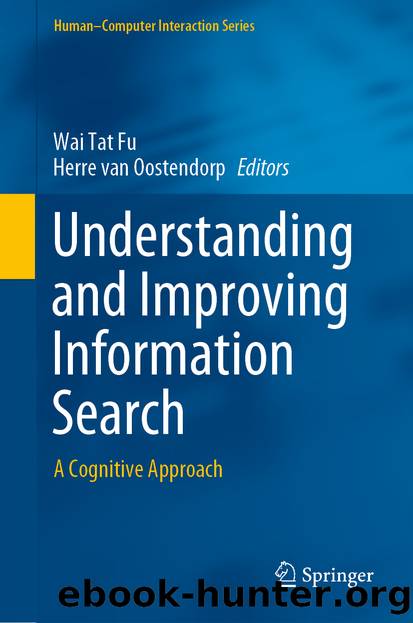Understanding and Improving Information Search by Unknown

Author:Unknown
Language: eng
Format: epub
ISBN: 9783030388256
Publisher: Springer International Publishing
8.5 Search Skill
The tools that we have seen so far are mostly designed to support searchers in finding relevant information and completing their tasks. As another research direction, educational tools for upskilling searchers (Allan et al. 2012) have also been studied.
Bateman et al. (2012) proposed an interface, called Search Dashboard, for reflection on personal search behavior. Search Dashboard presents an individual’s search history aggregated into 12 specific elements in three data types: techniques (e.g., the use of advanced query operators), tendencies (e.g., the number of search terms; the number of clicks per query), and topics (e.g., popular search categories; salient search terms). To help the searcher get an idea to improve his/her search, Search Dashboard also shows others’ search behavior aggregated based on three user archetypes: typical users, search experts, and topic experts. The authors conducted a five-week user study involving 90 participants, where they controlled which data type to show and whether to show others’ statistics for comparison. Findings from the study include the following: participants perceived less search skill at the end of the study, suggesting that they noticed their search behavior has room to improve through the use of Search Dashboard, showing the comparison data, of search experts in particular, increased the participants’ insights and changed their behavior (on the techniques and tendencies types).
Harvey et al. (2015) aimed to train searchers by providing high-quality query suggestions. To this end, three studies were carried out in their work. First, the authors investigated the characteristics of high-performing queries through a crowdsourced study, in which workers judged queries that achieve high average precision. A key finding from this study is that participants did not recognize many of presented queries as being effective. Second, as a pilot study, 22 participants interacted with a search interface that suggests high-quality queries. This interface also presents how effective the current query is. When searching with suggested queries, participants were asked to describe why they think those queries perform better than their own queries. A qualitative analysis of this feedback suggested that participants were able to notice properties that high-quality queries have. Finally, the authors conducted a main study involving 91 participants. Each participant was randomly assigned to one of three conditions: (a) presenting high-quality query suggestions recognized as effective in the first study; (b) presenting those recognized as ineffective; and (c) presenting no query suggestions. In the conditions (a) and (b), query suggestions were presented for the first four topics (i.e., training) and not for the rest two topics (i.e., test). Main findings from this study are as follows: participants exposed to high-quality query suggestions during the training phase were able to formulate effective queries by themselves during the test phase; queries submitted by those participants look similar to expert queries; and the recognizability of query suggestions did not have a significant effect on improving participants’ query formulations.
Suggesting search tactics and strategies is another attempt to improve the skill of searchers. Moraveji et al. (2011) focused on tactical search tips, which explain how to use the functionality offered by search systems (e.
Download
This site does not store any files on its server. We only index and link to content provided by other sites. Please contact the content providers to delete copyright contents if any and email us, we'll remove relevant links or contents immediately.
Cracking the GRE Premium Edition with 6 Practice Tests, 2015 (Graduate School Test Preparation) by Princeton Review(3590)
What It Really Takes to Get Into Ivy League and Other Highly Selective Colleges by Hughes Chuck(3217)
The Marketing Plan Handbook: Develop Big-Picture Marketing Plans for Pennies on the Dollar by Robert W. Bly(2408)
Fooled by Randomness: The Hidden Role of Chance in Life and in the Markets by Nassim Nicholas Taleb(2407)
The Tyranny of Metrics by Jerry Z. Muller(2397)
The Official Guide for GMAT Review 2015 with Online Question Bank and Exclusive Video by Graduate Management Admission Council (GMAC)(2336)
Ultralearning by Scott Young(2312)
50 Economics Classics by Tom Butler-Bowdon(2062)
The Visual MBA by Jason Barron(1626)
The Inevitable by Kevin Kelly(1554)
Data Science for Business by Foster Provost & Tom Fawcett(1509)
Out of the Crisis by Deming W. Edwards(1498)
GMAT Official Guide 2018 Verbal Review by GMAC (Graduate Management Admission Council)(1379)
The Conflict Resolution Phrase Book by Barbara Mitchell & Cornelia Gamlem(1339)
Cracking the LSAT, 2012 Edition by Princeton Review(1336)
Maths and Stats for Web Analytics and Conversion Optimization by Himanshu Sharma(1295)
The Personal MBA: Master the Art of Business by Josh Kaufman(1266)
College Essays that Made a Difference by Princeton Review(1263)
Cracking the SAT Premium Edition with 6 Practice Tests, 2017 by Princeton Review(1248)
